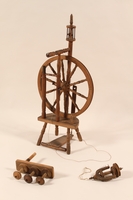Overview
- Description
- The papers consist of an original photograph of Jean Iarchy's parents, Moise and Laja Grad Iarchy, with friends at the Institut de Commerce in Antwerp, Belgium, in 1931, as well as two copyprints of Jean Iarchy's birthday party on April 4, 1941, and a copyprint of Moise and Jean Iarchy in the garden prior to going into hiding in the summer of 1941.
- Date
-
inclusive:
1931-1941
- Credit Line
- United States Holocaust Memorial Museum Collection, Gift of Jean Iarchy
- Collection Creator
- Jean Iarchy
- Biography
-
Jean Iarchy is the son of Moise Iarchy (b. August 14, 1908) and Laja Grad (b. Feb. 14, 1909). He was born on May 4, 1939, in Antwerp, Belgium, where his father was a diamond merchant and his mother worked as an accountant. Jean's parents were affiliated with the Portuguese synagogue in Antwerp and were active in several Jewish community organizations. On May 10, 1940, shortly after Jean's first birthday, Germany launched a surprise attack on Belgium. The Iarchys tried to flee to the coast, but had to return to Antwerp. The Germans enacted anti-Jewish laws and confiscated Jewish property and businesses. By 1942, there were regular round-ups to deport Jews for forced labor. The Iarchys decided that Grad, Jean, and his grandmother should go into hiding. In the beginning of 1942, a member of the resistance, Eugene Cougnet, brought them to his castle, the Chateau de Bassin in Mean. There were approximately 60 other Jews already hiding there. His mother did not think it was safe and they left on October 24th, 1942, the day before the castle was raided by the Germans. With the assistance of another resistance member, Joseph Lebouttte, they were hidden in the home of Mlle. Pierre in Durbuy. Moise attempted to join them, but was arrested at the train station in Malines and deported on the XII convoy 713 on September 15, 1942. He threw a postcard from the train which reached his family; they received one more postcard, and then never heard from him again. He died in the labor camp, Golleschau, a subcamp of Auschwitz, on January 14, 1943. Jean, his mother, and grandmother lived in Durbuy for the remainder of the war. Laja supported the family spinning wool and knitting stockings and sweaters. In September 1944, they were liberated by the U.S. Army. They returned to Antwerp the following summer, in time for Jean to start school. Their rescuers, Eugene Cougnet and Joseph Leboutte, were recognized by Yad Vashem as Righteous Among the Nations. Laja died in Antwerp, age 71, on March 20, 1980. Jean continues to reside in Antwerp where he has a medical practice.
Physical Details
- Genre/Form
- Photographs.
- Extent
-
1 folder
Rights & Restrictions
- Conditions on Access
- There are no known restrictions on access to this material.
- Conditions on Use
- Material(s) in this collection may be protected by copyright and/or related rights. You do not require further permission from the Museum to use this material. The user is solely responsible for making a determination as to if and how the material may be used.
Keywords & Subjects
- Topical Term
- Jews--Belgium--Antwerp--1930-1950.
- Personal Name
- Iarchy, Jean. Iarchy, Laja Grad. Iarchy, Moise.
Administrative Notes
- Holder of Originals
-
United States Holocaust Memorial Museum
- Legal Status
- Permanent Collection
- Provenance
- The photographs and copyprints were donated to the United States Holocaust Memorial Museum in 2005 by Dr. Jean Iarchy.
- Record last modified:
- 2024-04-01 11:42:03
- This page:
- https://collections.ushmm.org/search/catalog/irn523302
Download & Licensing
- In Copyright - Use Permitted
- Terms of Use
- This record is not digitized and cannot be downloaded online.
In-Person Research
- Request 7 Days in Advance of Visit
- Plan a Research Visit
-
Request in Shapell Center Reading Room
Bowie, MD
Contact Us
Also in Laja Grad Iarchy collection
The collection consists of a spinning wheel and photographs relating to the experiences of Laja Grad Iarchy, her son, Jean, and their family in Belgium before and during the Holocaust.
Date: 1931-1945

Wooden spinning wheel used while in hiding in Belgium
Object
Spinning wheel purchased by Laja Iarchy while she was living in hiding with her family in Durbuy, Belgium. She used it to spin wool from local sheep from which she knitted socks and sweaters that she sold to support her family. After the Germans invaded Belgium in May 1940, they enacted anti-Jewish legislation, confiscated property, and soon were targeting Jews for deportation to labor camps. To escape persecution, the Iarchy family decided to go into hiding in early 1942. Laja, her 3 year old son, Jean, and her mother left Antwerp and, with the assistance of the Belgium resistance, found refuge in Durbuy. Her husband, Moise, tried to join them there, but was arrested and deported to the Golleschau labor camp, where he died on January 10, 1943. Durbuy was liberated by US troops in September 1944. Laja and her family returned to Antwerp the following summer.



